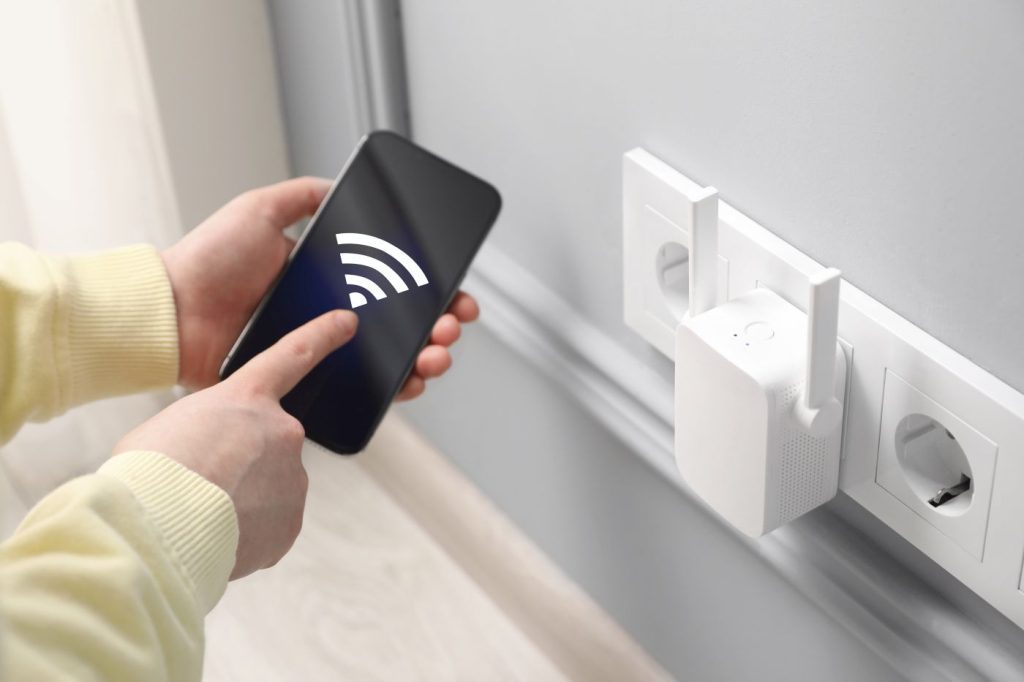Are you considering installing a Wi-Fi extender in your home, but you’re unsure how it will affect your internet speed?
While Wi-Fi extenders can be useful in some situations, they often come with more downsides than upsides – especially since there are usually better alternatives available.
So, in this article, I’ll go over how your internet speed / bandwidth are affected by Wi-Fi extenders, when they’re a good idea to use, and what other options you may consider instead.
Let’s get started!
Do Wi-Fi Extenders Affect Internet Speed?

When it comes to Wi-Fi extenders and internet speed, the answer is a little bit complicated.
If you are connecting to the Wi-Fi extender for your internet, your speed will indeed be lower – in fact, it will be cut roughly in half. This is because it adds extra ‘steps’ in the mix. Instead of connecting directly from your device to the router, it instead goes like this:
- Your device connects to the Wi-Fi extender.
- The Wi-Fi extender sends data packets to your router.
- Your router sends data packets back to the Wi-Fi extender.
- The Wi-Fi extender sends data back to your device.
All of the extra steps result in slower speeds, and lower bandwidth.
However, the devices connected directly to your router are unaffected – for the most part. If another device is using extra bandwidth with the Wi-Fi extender, this can result in less bandwidth left over for the devices connected to the router directly.
That being said, there are benefits to Wi-Fi extenders, so it may not be as bad of a choice as it sounds!
What If No One Is Using The Extender?
We now know that connecting to a Wi-Fi extender will result in lower speeds to your device. Not only that, but they also affect the amount of available bandwidth for the rest of your network.
But what if no one is actually using the extender at the moment, and it’s just running idle with nothing connected to it?
In these situations, you don’t have to worry.
As long as it’s not actively being used – or the amount of data running through it is small, it shouldn’t have much of an effect on devices connected directly to the router.
And hopefully, the extender is only being used if it’s actually needed.
So, there aren’t really any huge downsides to having one installed – it won’t negatively affect the rest of your internet as long as it’s not being used.
So, What Is The Benefit Of A Wi-Fi Extender?
Although you sacrifice speed and bandwidth, there are some situations where a Wi-Fi extender can come in handy.
The first – obviously, is if there are simply places in your home that your router doesn’t reach. While buying a more powerful router is generally preferred, sometimes this isn’t always an option – especially for very large homes.
In these instances, a Wi-Fi extender will indeed provide Wi-Fi where there would otherwise be none.
Wi-Fi extenders can also be useful to amplify a weak signal. While you will sacrifice overall speed, sometimes maintaining a reliable signal is more important.
For example, when playing online multiplayer games, you don’t actually use a lot of data – and do not need fast internet. What matters far more is reliability, as even losing connection for a split second can disconnect you from the game.
If signal strength is more important than internet speed, using a Wi-Fi extender can be a good idea.
Note: Avoid Chaining Multiple Wi-Fi Extenders Together!
As we’ve already covered, you suffer a noticeable decrease in bandwidth and speed – about 50%, when using a Wi-Fi extender.
However, this effect becomes dramatically worse if you chain multiple of them together!
For example, if you use one Wi-Fi extender to connect to another one, the bandwidth and speed is cut in half again – down to just 25% of what it would’ve been originally.
Remember, ultimately it is the modem connected to your router that provides your internet. All of those data packets still have to travel all the way to your router, and all the way back to your device.
Adding an additional extender will slow your internet down to a crawl, so it is rarely advised.
If this becomes a necessity, it may be time to look at additional options – such as using a mesh network, or even start connecting devices via ethernet if your device supports it.
Conclusion
Unfortunately, Wi-Fi extenders are not a perfect solution. Not only will you experience slower speeds while using them, but they can also eat up bandwidth that the rest of the network would utilize.
That being said, there is no harm when they aren’t being used, and connecting devices directly to your router (when possible) won’t result in degraded speeds.
I hope that this article has cleared some things up for you. If you still have any questions, ask them below and I’ll be happy to help.
Wishing you the best, and I hope you’ll find the Wi-Fi coverage you need!
– James McAllister
